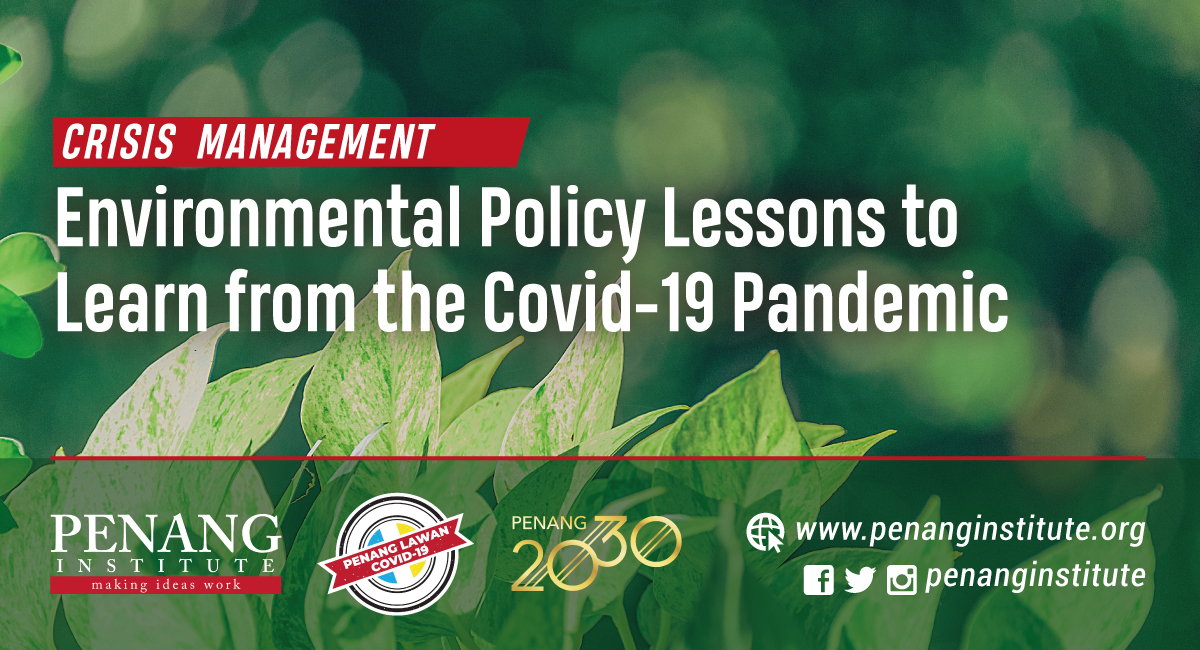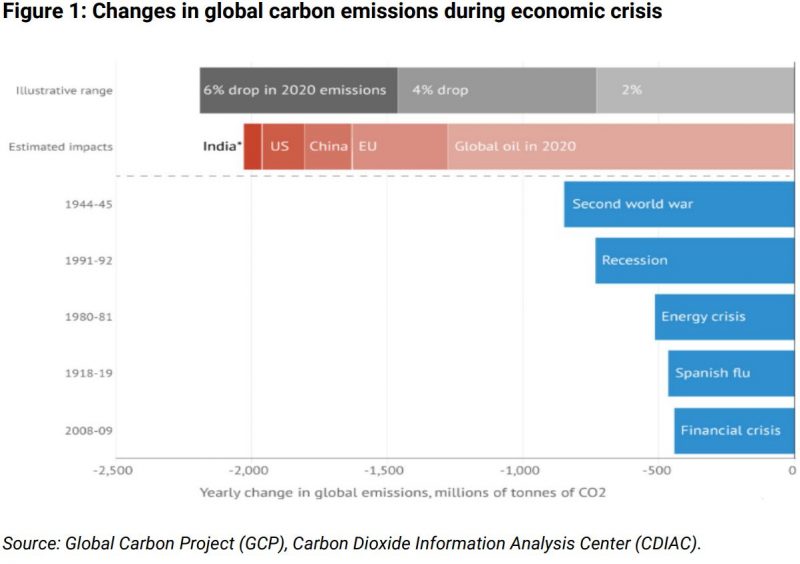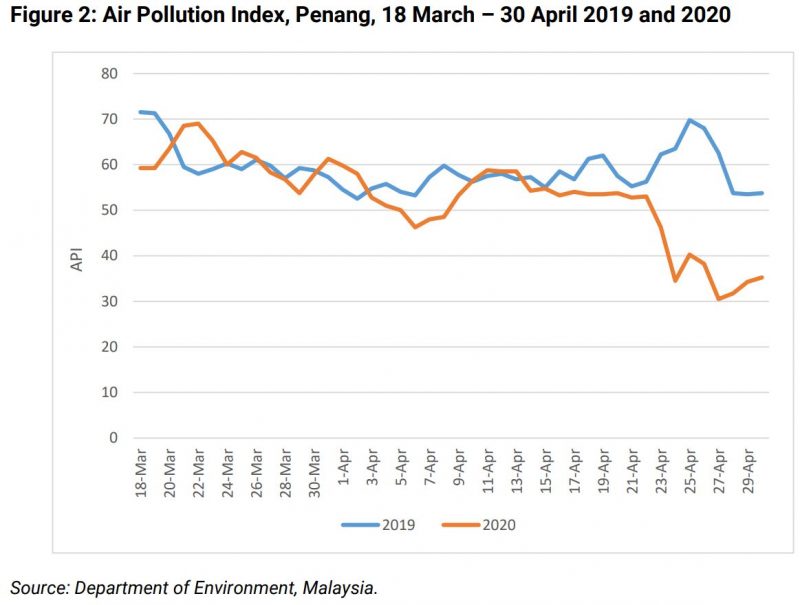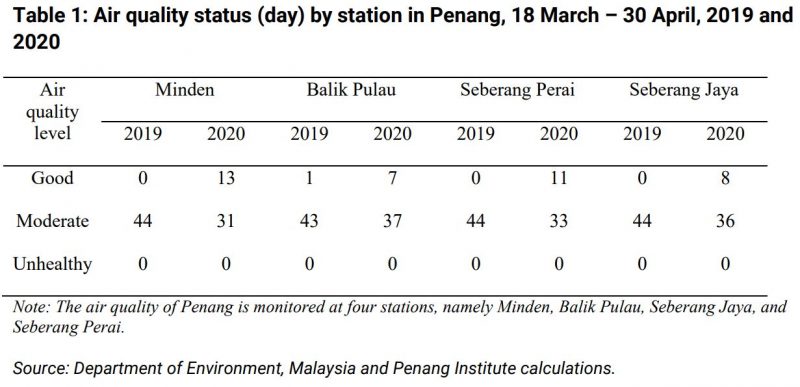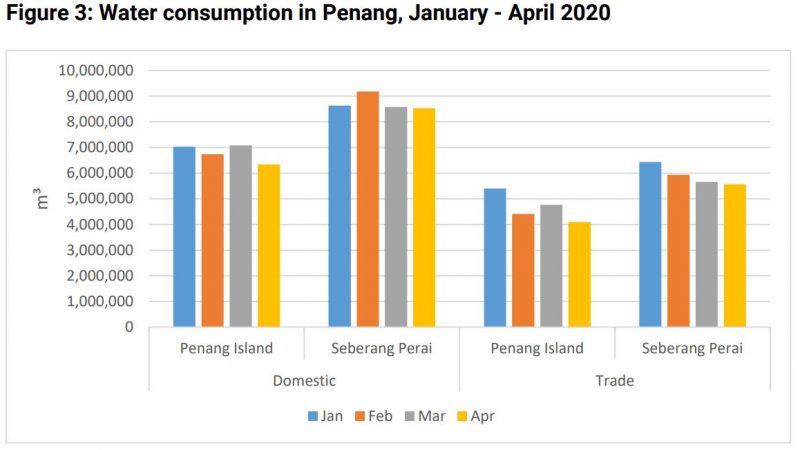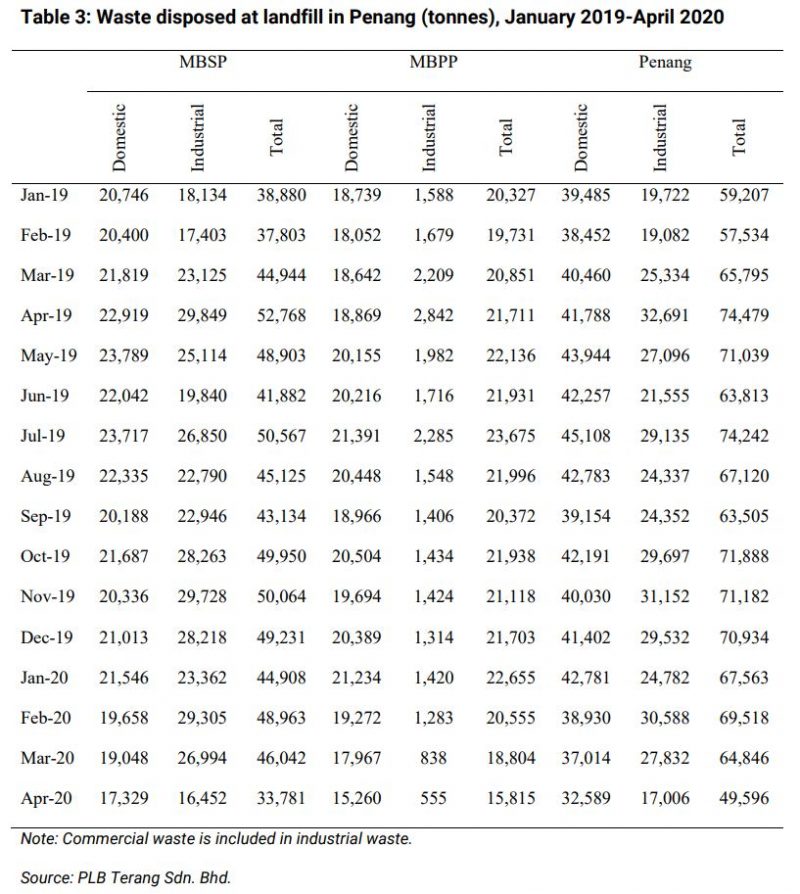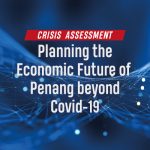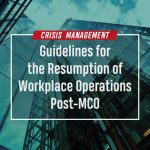EXECUTIVE SUMMARY
- Although the Covid-19 pandemic poses challenges for all economic sectors, from operational difficulties to acute financial shocks, it also presents a long-term opportunity for our natural environment and for industries related to it.
- The state of Penang has witnessed a dramatic drop in water and air pollution during the lockdown, yet this reduction cannot but be seen to be temporary and emissions are expected to rebound once economic activities recover – unless decisive action is taken.
- The good news is that the habits that quickly developed during the pandemic – such as remote working, contact-free services and reduced travel – indicate that we can operate under a low-carbon, green model.
- With lessons learned from the lockdown, the post-Covid-19 reconstruction phase should be centred around the green and blue economy to enable economic growth and investment that simultaneously enhance environmental quality and social inclusiveness.
INTRODUCTION
Covid-19 has caused a massive global reset. But while it may have devastated lives and communities and had a horrendous impact on the economy, it has, at least for the time being, reversed the fate of the environment for the better. The lockdown response to the Covid-19 pandemic has notably changed how society behaves and that behavioural change has had huge consequences for our natural environment. With the lockdown shutting down many industrial activities, reduced air traffic and keeping cars off the roads, pollution levels have fallen drastically. The pandemic is indeed affecting energy use and CO2 emissions around the world. Estimated emissions impacts on the global oil sector, the EU carbon market, China, the US and India show that the coronavirus has triggered the largest ever annual fall in CO2 emissions in the world, with carbon emissions from the burning of fossil fuels expected to fall by about 2 billion tonnes in 2020, a reduction of more than 5% compared to the global total in 2019 (Figure 1). This is also attributed to a huge drop in global energy demand in 2020. However, this reduction in carbon emission is not expected to last for long, unless fundamental changes in global energy production and consumption occur.
IMPROVEMENT IN AIR AND WATER QUALITY
According to the Department of Environment (DOE) Malaysia, Penang’s average Air Pollution Index (API)[1], which is a generalised way for describing air quality, improved by 10.1% during the first three phases of the Movement Control Order[2], compared to the same period in 2019. The number of good quality air[3] days increased from zero in March and April 2019 to 12 in March and April 2020 (Figure 2 and Table 1). The dramatic decline in pollution levels is mainly due to the reduced industrial and other economic activities as well as significant lifestyle changes. However, the air quality is expected to worsen once the lockdown is lifted and businesses are allowed to return to business as usual.
Air pollution and climate change are closely related. The current decline in emissions is unlikely to be sustained, and will have little impact on the total concentration of Greenhouse Gases (GHGs) that have accumulated in the atmosphere for decades. Moreover, it will be tempting for us to overlook the climate change challenge in the rush to restart the economy after the pandemic. The real impact of the Covid-19 crisis on the climate will therefore depend on choices that governments make, how they wish their economy to recover, and how much we will continue to rely on fossil fuels. Much political advantages can in fact, be gained from prioritising the reduction of air pollution and therefore climate risks, and in realising environmental health as an economic asset.
In addition, air quality is essential to people’s health. A study conducted by the Harvard University T.H. Chan School of Public Health[4] shows that there is a correlation between air pollution and Covid-19 death rates. People living with poor air quality may be more susceptible to this virus, and airborne particulate matter may even help to spread the virus. Hence, reducing air pollution may reduce Covid-19 risks. This means that the health of people and the health of the planet are inextricably interrelated.
The water quality status of rivers has always been an area of concern for various authorities, government agencies as well as the public at large. With the drop in human and industrial activities during the MCO period, many rivers became much cleaner than before. For instance, pictures taken from a drone shows that the water quality of Sungai Pinang[5] has seen significant improvement during the MCO[6]. Moreover, the lack of coastal tourists and the limited outdoor recreational activities caused a notable change in the appearance of beaches in Penang. For example, the sea at Batu Ferringhi has become cleaner and clearer during lockdown[7]. However, maintaining the positive change after the MCO can be a big challenge.
MARINE LIFE AND BLUE ECONOMY
The pandemic has also affected life at sea as well as the blue economy. In fact, blue economy sectors such as fisheries and aquaculture, coastal and marine tourism, and maritime transport, were notably affected. Supply chain disruptions, such as transport routes, limited access to ports, lower demand, and increased regulatory measures continue to undermine these sectors. For instance, fishing operations in Penang declined by as much as 70-90%[8], especially during the first phase of the MCO, from a combination of the risk of being at sea in a pandemic as well as supply chain complications caused by market closures. Although this has adversely affected the livelihood of fishing communities and the fishing industry as a whole, it may result in marine ecosystems recovery. During the last few decades of anthropogenic marine activity, marine environments have either perished as a result of overfishing and the subsequent decline in biodiversity or from species being dispersed beyond their native ranges. With less fishing activities during the MCO, it is possible that we will see improvements in fish stocks in the short term.
Shipping, as the main driver of world trade, is a major polluter. It accounts for 940 million tonnes of CO2 annually and about 2.5% of global greenhouse gas emissions[9]. Reduction in maritime activities due to decreased global trade as well as commercial boating activities because of reduced tourism have led to lower maritime emissions. It indicates that this crisis is an opportunity for adjustments with respect to energy consumption towards sustainable management of the oceans. For that to happen, investments are needed in greener technology and more sustainable fuel sources. The pandemic has shown how deeply our economy and wellbeing are linked to the oceans. Indeed, the Covid-19 crisis opens a window to make the fishery industry more sustainable and offers an opportunity to rebuild a sustainable ocean economy.
ENERGY AND WATER DEMAND
Energy is an essential input for all economic activities, and when business activities decline, the demand for energy consumption is naturally reduced. The pandemic has therefore notably impacted oil and electricity consumption.
In April 2020, electricity consumption in Penang dropped by about 16.4% compared to April 2019, largely due to a significant decline in industrial (25%) and commercial (11%) demand, as factories and businesses closed and people worked from home during the MCO (Table 2). Generally, industrial consumption accounts for more than 50% of total electricity consumption in Penang, and this is reflected in more pronounced declines in total electricity demand during the MCO.
In addition, demand for petroleum and liquid fuels dropped remarkably as a result of travel restrictions and disruptions to business and economic activities during the MCO[10]. The oil market has been also drastically affected by the pandemic partly due to the collapse in global oil demand which put downward pressure on oil prices. It is expected that energy-related CO2 emissions will decrease for a short period. The Covid-19 shutdown also holds consequences for the future of renewable and clean technology. In the short-term, renewables such as solar power and wind energy may become less competitive, and less interesting to investors as prices for oil continue to drop. But, in the long-term, oil price instabilities should accelerate the adoption of clean energy.
In April 2020, the total water consumption in Penang dropped by about 6%. This decline is more pronounced in trade water consumption on the Island (14%) (Figure 3), mainly due to the temporary closure of factories, hotels and businesses during the MCO. Penang has a highest water consumption rate in the country, but it has limited raw water resources. In fact, the true value of water needs to be measured and realised, and available water sources should be managed in such a way that water scarcity and pollution of water are avoided. Climate change has already altered the availability, quantity and quality of Penang’s water supplies. Hence, the water system should also be resilient against the impact of climate change events.
WASTE MANAGEMENT
Rapid economic development, industrialization and population growth have caused a remarkable increase in the quantity and types of solid waste generated in Penang. Municipal Solid Waste (MSW) consists of all types of solid waste generated by households and industrial/commercial establishments. Wastes that come from households and public areas, including those collected from residential buildings, litter bins, streets, marine areas and parks are known as domestic solid waste, while commercial/industrial solid waste are wastes that come from shops, restaurants, hotels, offices, as well as the waste produced by all industries. However, it does not include construction and hazardous wastes[11].
In April 2020, Penang’s total waste disposed at landfill was 1,653.2 tonnes per day (527.2 tonnes on Penang Island and 1,126 tonnes in Seberang Perai) – about 33.4% and 23.5% less than April 2019 and March 2020, respectively (Table 3). Domestic and industrial waste generation dropped by 12% and 39% respectively in April 2020 as compared to March 2020. The fall in domestic waste generation may be due to less waste being produced at public areas. As online shopping and food takeaways increased, a rise in plastic and packaging wastes is to be expected[12]. Furthermore, temporary closure of hotels, restaurants and factories led to a significant drop in commercial and industrial waste generation.
The safe management of domestic waste during Covid-19 could be a challenge, as medical waste such as contaminated masks, gloves, used or expired medications can easily be mixed with domestic waste. Yet, they must be treated as hazardous waste and disposed of separately to minimise possible environmental effects and to avoid them becoming another source of virus contamination.
POST COVID-19 AND ENVIRONMENTAL MANAGEMENT
Covid-19 offers us an important opportunity for re-designing our social and economic systems while enhancing environmental quality and social inclusiveness. The lockdown has shown us that our lifestyles can have a harmful impact on our environment and eventually our health. It has given us a glimpse into what the world might look like if we live sustainably and conserve our natural resources.
As we try to get the economy back in shape, we should avoid the temptation to go back to intensive use of natural resources. Effective responses and recovery plans need to take into account the pandemic’s deep roots in environmental stresses. A combination of policy and structural changes, conscious efforts to minimise GHG emissions at the individual level, and better awareness levels can now visibly lead to positive tangible results.
PROPOSED MEASURES TO IMPROVE ENVIRONMENTAL QUALITY
1) Short-term measures:
– Reducing lifestyle carbon footprint: The pandemic has already changed the way we work and live. It has formed new habits – e.g. online shopping, remote working, taking meetings and conferences online and cutting unnecessary travels. Such practices might improve not only our natural environment but also our work-life balance, and should therefore be maintained to the extent possible, even after the pandemic ends. It is therefore recommended that these lifestyle changes be promoted and become mainstreamed in society as part of a broader effort to move towards behaviours required for a low-carbon society. It is indeed important to consider what kinds of policies are required in order to realise this transformative behavioural change. The new normal can be cleaner, greener and more sustainable, for business and for nature.
– Managing household medical waste: Household medical waste generation of items such as disposable masks, gloves, and wipes, have significantly increased during the pandemic. These items need proper handling and disposal to avoid damaging the environment as well as further exacerbating the outbreak. They should not be recycled with other plastics. It is important to increase awareness by educating households on the disposal of their medical wastes. Household medical waste needs to be properly packaged and secured tightly. Frontline workers who collect, transport and manage waste should be protected by regular sanitisation of vehicles and equipment, as well as providing personal protective equipment for them. Hence, an appropriate system for effective household medical waste management is needed.
– Cutting packaging waste: During the Covid-19 pandemic, usage of single-use plastic bags, containers and cutleries, which are perceived as more sanitary, have notably increased. Hence, plastic pollution will more likely become a huge environmental issue in the near future, unless we take decisive action to minimise it. A more sustainable solution would be replacing disposable plastic packaging with reusable packaging. It is recommended that the government in partnership with the private sector develop reusable to-go services for take-out and food delivery. These services can provide clean, sanitized reusable cups and to-go containers (e.g. reusable tiffin boxes) to restaurants, cafes and street vendors. Empty tiffin boxes should be returned by costumers via exchange at the next meal delivery. They can be collected by relevant companies, washed and commercially sanitised, then put back into service. Nonetheless, this approach cannot be effective without a proper monitoring and enforcement system. Besides reducing waste generation and plastic pollution, a reusable food delivery system will create jobs and support economic diversification.
Another possible solution would lie in a focusing on the “Circular Economy”. The base design and choice of the raw materials of packages are very important. These should be circular base materials. For instance, bioplastics, which are plastics that are no longer created from the use of fossil fuels, can be recycled both chemically and mechanically. It helps to drive plastics away from landfill into the recycling and circular economies.
2) Medium-term measure:
– Promoting green recovery: The government has introduced stimulus packages to mitigate losses in income or employment. However, while conventional fiscal stimulus measures which mainly support fossil fuel-intensive industries might result in short-term economic recovery, they may fail to achieve long-term changes in the socioeconomic structure required to prevent similar crises in the future. Economic stimulus packages should preferably also contribute towards a more sustainable, resilient and inclusive society in the future. An economic recovery plan should in fact incorporate the concept of green recovery and integrate the SDGs into the review and screening of Covid-19 recovery packages.
3) Long-term measures:
– Responding to the climate crisis: Putting in place regulations and policies to minimise the carbon footprint, to secure behavioural changes, and to establish socioeconomic safety nets for the most vulnerable will significantly help deal with climate change issues. It is important to ensure that economic recovery plans prioritise investments in cleaner and renewable energy facilities, as well as assist businesses, particularly in carbon-intensive sectors, in making drastic cuts in emissions. Financing policies should be geared towards requiring banks to invest less in fossil fuel and more in climate change mitigation and resilience efforts.
– Moving towards a green economy and sustainable society: To minimise the likelihood of similar pandemics in the future, policies and measures that strengthen resilience needs to be undertaken. A healthier economy has to be one that is low on carbon emissions, high in resilience and centred on human wellbeing. As the country rebuilds its economy, pursuing economic development in an environmentally sustainable manner is vital. Yet, Covid-19 has shown us that green growth alone will not ensure sustainability, as it might worsen social problems such as inequality. Thus, for green growth to succeed as a transformative sustainable development strategy, integrating social concerns into the economy-environment nexus is essential. This will indeed improve social resilience. Furthermore, during the economic recovery, it is important to embrace renewable energy, green technology and sustainable new sectors that put the country on a fast-track path to decarbonisation. We need to focus on critical sectors such as energy transition, food systems, waste and mobility. Investment in diversified renewable energy can offer greater economic growth and stability than that provided by fossil fuels because of recent oil market instability. Scrapping fossil fuel subsidies and taxing carbon are also recommended. Moreover, transition to a green economy would provide many much-needed jobs in green energy and infrastructure.
– Building blue economy: The Covid-19 stimulus packages mainly focus on supporting land-based industries and communities, as well as greener modes of operation. Yet, similar opportunities await us in our ocean and on our coasts. In order to attain more sustainable and inclusive economic development, sustainable management of the blue economy is required. It amounts in fact to sustainable use of aquatic resources for economic growth, to the improvement of human well-being and social equity, and to protection against negative environmental externalities such as pollution and climate change. The blue economy approach also helps to restore and conserve biodiversity and natural resources, protect against overfishing, and facilitate the transition towards a low-carbon economy and a renewable “blue” energy generation. Building the blue economy will need a clear vision that brings together the government, businesses and the local community, particularly small-scale fishing, into a facilitated dialogue that will be mutually beneficial for all. Similarly, public-private partnerships need to be established to improve communications between agencies to enable better understanding and sharing of ideas and strategies.
[1] The air pollutants included in Malaysia’s API are ozone (O3), carbon monoxide (CO), nitrogen dioxide (NO2), sulphur dioxide (SO2), and particulate matter with a diameter of less than 10 microns (PM10).
[2] From 18 March 2020 to 30 April 2020.
[3] API levels of up to 50 is considered good, between 51 and 100 moderate, 101 and 200 unhealthy, 201 and 300 very unhealthy, and 300 and above hazardous.
[4] Wu, X., Nethery, R. C., Sabath, B. M., Braun, D., & Dominici, F. (2020). Exposure to air pollution and COVID-19 mortality in the United States. medRxiv. doi: https://doi.org/10.1101/2020.04.05.20054502
[5] Sungai Pinang’s water quality was categorized at moderate pre-MCO.
[6] The Straits Times. (2020, April 28). Coronavirus: Penang river green again, thanks to MCO. Retrieved from: https://www.straitstimes.com/asia/se-asia/penang-river-green-again-thanks-to-mco
[7] The Star. (2020, April 25). Cleaner waterways and rivers during MCO. Retrieved from: https://www.thestar.com.my/news/nation/2020/04/25/cleaner-waterways-and-rivers-during-mco
[8] Vaghefi, N. (2020). The Heavy Impact of Covid-19 on the Agriculture Sector and the Food Supply Chain. Covid-19 Crisis Assessments. Penang Institute. Retrieved from: https://penanginstitute.org/wp-content/uploads/2020/04/The-Heavy-Impact-of-Covid-19-on-the-Agriculture-Sector-and-the-Food-Supply-Chain.pdf
[9] IMO. (2014). Third IMO GHG Study 2014. Retrieved from: http://www.imo.org/en/OurWork/Environment/PollutionPrevention/AirPollution/Pages/Greenhouse-Gas-Studies-2014.aspx
[10] Augustin, R. (2020, April 18). Petrol dealers fear dry pumps when MCO ends. FMT news. Retrieved from: https://www.freemalaysiatoday.com/category/nation/2020/04/18/petrol-dealers-fear-dry-pumps-when-mco-ends/
[11] Kadir, A. A., & Abidin, S. S. S. Z. (2016). Solid Waste Composition Study at Taman Universiti, Parit Raja, Batu Pahat. In IOP Conference Series: Materials Science and Engineering (Vol. 136, No. 1, p. 012047). IOP Publishing. Climate & Clean Air Coalition.
[12] Data on plastic waste generation and recycling rate during MCO are as yet not available.
You might also like:
![Planning the Economic Future of Penang beyond Covid-19]()
Planning the Economic Future of Penang beyond Covid-19
![Guidelines for the Resumption of Workplace Operations Post-MCO]()
Guidelines for the Resumption of Workplace Operations Post-MCO
![Covid-19 Exit Strategies in East Asia: Choosing between a Suppress and Lift Procedure and a Stagge...]()
Covid-19 Exit Strategies in East Asia: Choosing between a "Suppress and Lift" Procedure and a Stagge...
![Reevaluating Southeast Asian Public Health Strategies in Preparation for a Second Wave of Covid-19 I...]()
Reevaluating Southeast Asian Public Health Strategies in Preparation for a Second Wave of Covid-19 I...
![Penang Next Normal has to be a Whole-of-Society Effort]()
Penang Next Normal has to be a Whole-of-Society Effort

